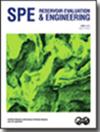Soave-Redlich-Kwong状态方程与Peng-Robinson状态方程a函数预测气-重油/沥青-水系统饱和压力的比较评价
IF 1.5
4区 工程技术
Q3 ENERGY & FUELS
引用次数: 1
摘要
为了准确预测气(es)-稠油/沥青-水体系的饱和压力,选择了几个α函数,并分别对Soave-Redlich-Kwong状态方程(EOS)和Peng-Robinson状态方程(PR)在降低温度(Tr) 0.70和0.60下进行了评估。更具体地说,从公共领域收集了天然气(es)-重油/沥青-水系统的164个测量饱和压力数据点,同时对稠油相关混合物和水开发的所有α函数进行了审查和选择。在Tr = 0.70时,前者包括已有的3个α函数,以及Tr = 0.70时新开发的2个α函数和Tr = 0.60时新开发的3个α函数,后者包括2个α函数,可用于评价不同条件下各种气(气)-重油/沥青-水体系的饱和压力。实测饱和压力与预测饱和压力之间的绝对平均相对偏差(AARD)随着伪分量(PC)数的增加或在Tr = 0.60时重新定义离心因子(ω)而不是常规的Tr = 0.70时减小。除了验证我们的编码程序外,CMG WinProp模块及其默认二进制相互作用参数(BIPs)分别用于量化上述系统的饱和压力,PR EOS和SRK EOS的总体AARD分别为27.34和28.39%。Chen和Yang(2017)在Tr = 0.60时新开发的推荐α函数,将稠油分别视为1个PC和6个PC,更准确地预测饱和压力,总体AARD分别为3.88和1.64%。本文章由计算机程序翻译,如有差异,请以英文原文为准。
Comparative Evaluation of a Functions for the Soave-Redlich-Kwong Equation of State and the Peng-Robinson Equation of State to Predict Saturation Pressures for Gas(es)-Heavy Oil/Bitumen-Water Systems
To accurately predict saturation pressures for gas(es)-heavy oil/bitumen-water systems, several α functions have been selected and evaluated at a reduced temperature (Tr) of 0.70 and 0.60 for the Soave-Redlich-Kwong equation of state (EOS) and Peng-Robinson (PR) EOS, respectively. More specifically, 164 data points of measured saturation pressures of gas(es)-heavy oil/bitumen-water systems are collected from the public domain, while all α functions developed for heavy oil-associated mixtures and water have been reviewed and selected. At Tr = 0.70, the former, including three existing α functions, as well as two newly developed α functions at Tr = 0.70 together with three new α functions at Tr = 0.60, and the latter, including two alpha functions, are used to evaluate saturation pressures for various gas(es)-heavy oil/bitumen-water systems under various conditions. The absolute average relative deviation (AARD) between the measured saturation pressures and their predicted ones is found to decrease with either an increase in the pseudocomponent (PC) number or redefining the acentric factor (ω) at Tr = 0.60 other than the conventional one at Tr = 0.70. In addition to validating our coded program, the CMG WinProp module, together with its default binary interaction parameters (BIPs) is used to, respectively, quantify saturation pressures of the aforementioned systems with an overall AARD of 27.34 and 28.39% for the PR EOS and SRK EOS. The recommended α function newly developed at Tr = 0.60 by Chen and Yang (2017) predicts saturation pressures more accurately with an overall AARD of 3.88 and 1.64% by, respectively, treating the heavy oil as one PC and six PCs.
求助全文
通过发布文献求助,成功后即可免费获取论文全文。
去求助
来源期刊
CiteScore
5.30
自引率
0.00%
发文量
68
审稿时长
12 months
期刊介绍:
Covers the application of a wide range of topics, including reservoir characterization, geology and geophysics, core analysis, well logging, well testing, reservoir management, enhanced oil recovery, fluid mechanics, performance prediction, reservoir simulation, digital energy, uncertainty/risk assessment, information management, resource and reserve evaluation, portfolio/asset management, project valuation, and petroleum economics.

 求助内容:
求助内容: 应助结果提醒方式:
应助结果提醒方式:


